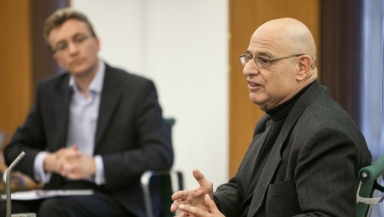
A few years ago, I heard a story which made the hairs on the back of my neck stand on end. A conference speaker, talking about his life in the inner city slums, recalled the time that he was confronted by a violent gang in the dead of night. He was talking about being and bringing light into the darkest places of our world – and this was certainly one of the darkest places he'd ever been. His response to their confrontation – "I know what you are" – referred to his belief that there was actually something demonic about what had happened. He invoked the name of Jesus. They scattered. That speaker was Bart Campolo.
Last week, a string of articles emerged about Campolo, the Christian social activist, writer, speaker and charity founder. Or rather, the formerly Christian activist – according to the writers, and to his own online bio, Campolo now identifies himself as a secular humanist who has 'transitioned from Christianity.'
Campolo's surname goes before him. As the son of veteran preaching legend Tony, the controversy he's sometimes courted has always been amplified by his family connection. That's why Ed Stetzer's post for Christianity Today entitled 'Deconversion' attracted so much attention; it's also why Frank Schaeffer – another secular voice with a famous Christian father – leapt to Campolo's defence with a somewhat ranty response piece which claimed CT had always had the knives out for Bart – and his parents.
In his article, Stetzer not only effectively 'broke' the news of Campolo's loss of faith, but also sought to draw some lessons for the church out of the situation. Somewhat extraordinarily – and much to Schaeffer's dismay – Stetzer seems to suggest that despite the fact that is Bart now in his forties, his father should bear some responsibility for his later-life rejection of the faith. He writes: "Do my children have a faith of their own? ...As parents we need to work to ensure our children have a relationship with Jesus, not just a desire to be part of a loving community doing good."

Intentionally or otherwise, Stetzer is suggesting that Bart's loss of faith is due to the 'social gospel' his father instilled in him. It's a rather uncharitable association to make, but hints at a wider concern among evangelicals that this is where a progressive, left-leaning faith eventually takes you.
A more balanced version of events comes from Rob Asghar at Forbes.com, a colleague of Bart's at his new employer, the University of Southern California. Freed from the need to 'apply' the news into a lesson, he speaks warmly of his friend and celebrates his leadership journey and his new role, which Bart's new head of department calls "a crucial addition, because I think there's a hunger for an engaged and active secular humanist community." One might speculate that such a thing would terrify American conservatives.
Unlike Stetzer, Asghar has spoken to Campolo jnr, and includes some words from him in his piece. In essence, his loss of faith seems to result to a long-term battle with concerns about the character of God, and why he allows suffering and evil. "We'd underline the parts we like and ignore the parts we didn't like," Campolo told Asghar. "I underlined some verses about a loving, all-inclusive, God and ignored some other verses."
Which all sounds very heretical. The thing is, Campolo's decision comes out of the pain of first hand experience of suffering. As a Christian leader he was always committed to incarnational, inner-city living (many, many others followed him in), but that meant he saw some incredibly dark things. He lived alongside the marginalised and the broken, and in the end, it broke him too. The idea of a loving God was just too difficult for him to reconcile with the evil he saw all around. For those of us living in affluent suburbia (and I include both Ed Stetzer and myself in that category), it's impossible to understand what that feels like. Until we've cried with victims of gang rape, watched families ripped apart by gang warfare or drug addiction, or seen the slow agonising decline of alcoholism first hand, all around us, every day... I'm not sure we get the right to blame faith loss on the left-leaning theology of someone's father.
On a personal level, I found the news of Bart's 'deconversion' difficult. I spent some time with him in 2007 and found him unmistakably Christ-like in his demeanour. As I've already mentioned, I heard him give one of the most electric and memorable talks I've ever been present for.
In fact I find it hard to reconcile how the man who at the time absolutely believed he'd told demons to flee in the name of Jesus, now imagines that to have been a trick of the mind. And so like Ed Stetzer, I pray that at some point, in new surroundings, Bart will find new hope and even a reconnection with his former faith. But I cannot blame him for his decision; nor can I blame his dad, or the social gospel. Until I've seen what he has seen, I simply don't have the right.













